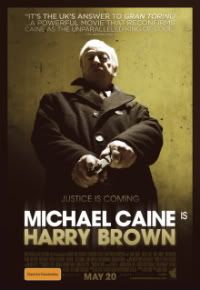 You know you’re seeing a movie aimed at an older demographic when the overwhelming smell that hits you when you walk in the cinema is Dencorub. Starring septuagenarian Michael Caine, continuing to be the coolest person in any movie he’s in, Harry Brown portrays the gritty fantasy world many people desire, where everyday people—senior citizens or no—turn vigilante to stop the rise of crime on the streets.
You know you’re seeing a movie aimed at an older demographic when the overwhelming smell that hits you when you walk in the cinema is Dencorub. Starring septuagenarian Michael Caine, continuing to be the coolest person in any movie he’s in, Harry Brown portrays the gritty fantasy world many people desire, where everyday people—senior citizens or no—turn vigilante to stop the rise of crime on the streets.Harry Brown lives a lonely life; his wife is seriously ill in hospital, and his only friend is Len, a man bitter about the thugs in their council estate and who moonlights as a caretaker in a local school for the differently abled. (Not really; but as soon as actor David Bradley appears onscreen, I defy you not to stage-whisper “It’s Filch from Harry Potter!” I mean, they even gave him the same hair.) When Harry’s beloved wife passes on, he is anguished; Len consoles him, but still retains his anger for the hooligans, revealing he is now carrying a weapon to fight with. That night, Len is killed in the estate’s pedestrian underpass, as ominous a place as the tunnel in Inglourious Basterds.
Now alone in the world, Harry is determined to wreak vengeance on those he knows killed his friend. An ex-marine, he knows how to keep calm in the face of the enemy. And so he does, the police—next to useless in the fight against these kids—vaguely on his trail.
Like Harry himself, you should probably bring your inhaler along for this, because you may forget to breathe. Tense from the devastating opening scene to the last moment, director Daniel Barber’s gripping style is immediate, shocking and emotional. Silent, heartbreaking scenes are played along with moments of shuddering brutality scored with ominous perfection by Ruth Barrett and Martin Phipps. I’d enjoy saying the movie was cut through with dashes of humour but really, it’s not. It isn’t a hopeless movie, but it’s no comedy; there is little humour to be leached from the subject matter of the decline of council estate security. There may have been a joke once. I mean, I must have been able to relax enough to breathe at some point; the idea that I held my breath for the entire 110 minutes is preposterous, but 55 minutes seems feasible.
When Harry sees the ruffians getting up to their shifty business practices in the underpass from his newfound viewpoint in Len’s ransacked home, you feel like you’re right there with him, watching with teeth-clenching apprehension for something terrible to happen. Drugs are sold, people are beaten; Harry watches it all with the same horror the viewers feel. You’ll be reaching for your phone, wanting desperately to call the police, but knowing their track record in the estate, you are as helpless as Harry is. Of course, you’re probably not an ex-Marine with no family or friends and nothing to lose, so you might not choose the same path that Harry does.
So does Harry Brown idealise vigilantism? It’s hard to say. You can’t argue that stabbing someone to death will stop them from viciously assaulting people, selling drugs in your neighbourhood and pushing burning dogshit through your mailbox. That’s not how society is supposed to work, of course, but if the police are no help, what choices will people feel they have? Of course, because this is real life, Harry doesn’t skip around building traps like Gerard Butler does in Law Abiding Citizen; he gets himself into awkward situations and isn’t immune to injury or ageing. There is a very real sense of danger in this film, with no guarantee of everyone likeable surviving.
Along with Alfie and Filch, the movie also stars Emily Mortimer as the one police officer trying to catch the killers—whoever they may be—in a business where single cases of estate violence are considered a low priority in the seemingly unsolvable bigger picture. She is superb, as are the actors playing the criminals, who are as real as anyone you’ve avoided on the street and will scare the pants off you. One scene, with a strung-out arms dealer who scratches his scalp incessantly and offers his unconscious and overdosing girlfriend to Harry for fifty quid, is especially unsettling.
With enough blood and bodies to satisfy Tarantino’s bloodlust yet never stray into ridiculousness, it’s a movie that isn’t for those with nervous dispositions. It’s not violent to sate the needs of a hungry cinemagoer, but violent to prove a point. It’s an incredible piece of filmmaking, with some of the saddest moments you’ll see in cinema; also, word is it’s Michael Caine’s final leading role. So go see it and give him the retirement fund payout he so richly deserves. And, of course, to hear ol’ Caine refer to his wife Kath as “Kaff”.


No comments:
Post a Comment
Opinions, opinions! Come one, come all.